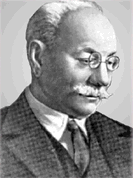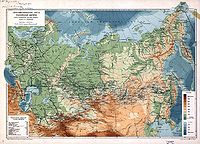
Yuly Shokalsky
Encyclopedia

Saint Petersburg
Saint Petersburg is a city and a federal subject of Russia located on the Neva River at the head of the Gulf of Finland on the Baltic Sea...
— March 26, 1940, Leningrad
Leningrad
Leningrad is the former name of Saint Petersburg, Russia.Leningrad may also refer to:- Places :* Leningrad Oblast, a federal subject of Russia, around Saint Petersburg* Leningrad, Tajikistan, capital of Muminobod district in Khatlon Province...
) was a Russia
Russia
Russia or , officially known as both Russia and the Russian Federation , is a country in northern Eurasia. It is a federal semi-presidential republic, comprising 83 federal subjects...
n oceanographer, cartographer, and geographer
Geographer
A geographer is a scholar whose area of study is geography, the study of Earth's natural environment and human society.Although geographers are historically known as people who make maps, map making is actually the field of study of cartography, a subset of geography...
.
A grandson of Anna Kern
Anna Petrovna Kern
Anna Petrovna Kern, née Poltoratskaya , was a Russian socialite and memoirist, best known as the addressee of what is probably the best known love poem in the Russian language, written by Pushkin in 1825....
, Pushkin's celebrated mistress, Shokalsky graduated from the Naval Academy in 1880 and made a career in the Imperial Russian Navy
Imperial Russian Navy
The Imperial Russian Navy refers to the Tsarist fleets prior to the February Revolution.-First Romanovs:Under Tsar Mikhail Feodorovich, construction of the first three-masted ship, actually built within Russia, was completed in 1636. It was built in Balakhna by Danish shipbuilders from Holstein...
, helping establish the Sevastopol Marine Observatory and rising to the rank of Lieutenant-General in 1912. At the same time, he developed interest in limnology
Limnology
Limnology , also called freshwater science, is the study of inland waters. It is often regarded as a division of ecology or environmental science. It covers the biological, chemical, physical, geological, and other attributes of all inland waters...
and meteorology
Meteorology
Meteorology is the interdisciplinary scientific study of the atmosphere. Studies in the field stretch back millennia, though significant progress in meteorology did not occur until the 18th century. The 19th century saw breakthroughs occur after observing networks developed across several countries...
and became the most prolific Russian author on the subjects. In the Marine Miscellanies alone, he published some 300 articles.

Meteorology
Meteorology is the interdisciplinary scientific study of the atmosphere. Studies in the field stretch back millennia, though significant progress in meteorology did not occur until the 18th century. The 19th century saw breakthroughs occur after observing networks developed across several countries...
and hydrology
Hydrology
Hydrology is the study of the movement, distribution, and quality of water on Earth and other planets, including the hydrologic cycle, water resources and environmental watershed sustainability...
and emphasized the importance of monitoring marine phenomena in order to understand global changes of climate. Shokalsky insisted on differentiating oceanography and hydrography
Hydrography
Hydrography is the measurement of the depths, the tides and currents of a body of water and establishment of the sea, river or lake bed topography and morphology. Normally and historically for the purpose of charting a body of water for the safe navigation of shipping...
and coined the term "World Ocean
World Ocean
The World Ocean, world ocean, or global ocean, is the interconnected system of the Earth's oceanic waters, and comprises the bulk of the hydrosphere, covering almost 71% of the Earth's surface, with a total volume of 1.332 billion cubic kilometres.The unity and continuity of the World Ocean, with...
".
In 1904, Shokalsky was elected into the Royal Geographical Society
Royal Geographical Society
The Royal Geographical Society is a British learned society founded in 1830 for the advancement of geographical sciences...
. Ten years later, he was put in charge of the Russian Geographical Society and retained the post until 1931. His name is given to the Shokalsky Strait
Shokalsky Strait
Shokalsky Strait is a 50 km-wide strait in Russia. It separates Bolshevik Island from October Revolution Island, and connects the Laptev Sea in the west with the East Siberian Sea in the east. It is named after Russian oceanographer Yuly Shokalsky....
connecting the Laptev Sea
Laptev Sea
The Laptev Sea is a marginal sea of the Arctic Ocean. It is located between the northern coast of Siberia, the Taimyr Peninsula, Severnaya Zemlya and the New Siberian Islands. Its northern boundary passes from the Arctic Cape to a point with co-ordinates of 79°N and 139°E, and ends at the Anisiy...
and the Kara Sea
Kara Sea
The Kara Sea is part of the Arctic Ocean north of Siberia. It is separated from the Barents Sea to the west by the Kara Strait and Novaya Zemlya, and the Laptev Sea to the east by the Severnaya Zemlya....
, to the large Shokalsky Island in the Kara Sea, and to the ship Akademik Shokalskiy
Akademik Shokalskiy
MV Akademik Shokalskiy is an ice-strengthened ship, built in Finland in 1982 and originally used for oceanographic research. In 1998 it was fully refurbished to serve as a cruise ship for Arctic and Antarctic cruises. It was named after the Russian oceanographer Yuly Shokalsky...
.

